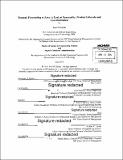Demand forecasting at Zara : a look at seasonality, product lifecycle and cannibalization
Author(s)
García, José M. (José Manuel)
DownloadFull printable version (7.180Mb)
Other Contributors
Leaders for Global Operations Program.
Advisor
Josef Oehmen and Georgia Perakis.
Terms of use
Metadata
Show full item recordAbstract
Zara introduces 10,000 new designs every year and distributes 5.2 million clothing articles per week to a network of over 1925 stores in more than 86 countries. Their high product mix and vast global network makes demand forecasting for Zara a challenging endeavor. This thesis sets out to incorporate the effects from seasonality, product lifecycle, and cannibalization into a long term aggregate demand forecast and a short term SKU replenishment forecast. For seasonality, there are two categories of events that are explored in detail: 1) Macro patterns, which are the year to year sales patterns that remain fairly consistent, such as rising sales in spring; and, 2) Specific Events, which refers to events that have an impact on demand but shift dates from one year to the next, such as Easter or Ramadan. These two factors are used to forecast short and long term aggregated store demand by using regression that leverages historical demand with dummy variables for specific events. Product lifecycle and cannibalization are incorporated in the SKU demand forecast. Products at Zara experience a majority of their sales in the first few weeks in the store. For this reason, when forecasting demand for replenishment purposes, it is of paramount importance to understand: 1) How long the item has been in a store; and, 2) how many new items are being displayed for the first time at the store on the week in question. This thesis details a methodology that successfully uses regression to incorporate both of those components. In addition to detailing the methods for-forecasting demand this thesis also covers: an overview of the current forecasting methodology and the special characteristics of Zara's demand; a results section which detail reductions in forecast error from 21% to 17%. This has the potential to reduce lost sales by 24%; lastly, it details implementation efforts at Zara.
Description
Thesis: S.M., Massachusetts Institute of Technology, Engineering Systems Division, 2014. In conjunction with the Leaders for Global Operations Program at MIT. Thesis: M.B.A., Massachusetts Institute of Technology, Sloan School of Management, 2014. In conjunction with the Leaders for Global Operations Program at MIT. Cataloged from PDF version of thesis. Includes bibliographical references (pages 78-79).
Date issued
2014Department
Leaders for Global Operations Program at MIT; Massachusetts Institute of Technology. Engineering Systems Division; Sloan School of ManagementPublisher
Massachusetts Institute of Technology
Keywords
Engineering Systems Division., Sloan School of Management., Leaders for Global Operations Program.